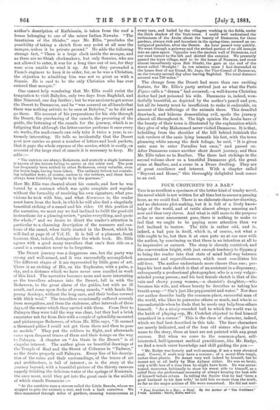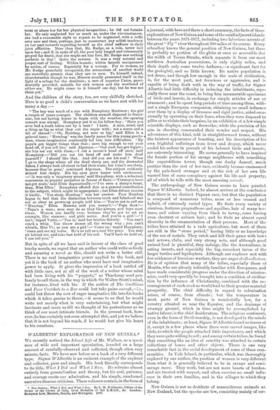FOUR CROTCHETS TO A BAR.* Tins is as excellent a
specimen of the better kind of trashy novel,. the novel which is not written for all time but to amuse a passing hour, as we could find. There is no elaborate character-drawing, and no elaborate plot-making, but it is full of a lively know- ledge of the world, and of rattle almost always amusing and now and then very clever. And what is still more to the purpose• so far as mere amusement goes, there is nothing to make us feel that we ought to be paying more attention than we feel inclined to bestow. The title is rather odd, and is, indeed, a bad pun in itself, which is, of course, not what a' title ought to be, but then it at once puts us at our ease with the author, by convincing us that there is no intention at all to be impressive or earnest. The story is cleverly contrived, and the conversation bright, with just enough tendency to flippancy to bring the reader into that state of mind half-way between amusement and superciliousness, which most conciliates his self-love. The author understands more classes than one ; per- haps his best male sketch is that of an assistant in a dispensary, subsequently a professional photographer, who is a very vulgar minded young person ; and his best female sketch is that of the vain and showy young woman,—a chemist's daughter,—who becomes his wife, and whose beauty be describes as taking his breath away—" She's just like peppermint and water." Nor does our author describe badly the common-place, successful man of the world, who likes to patronise others so much, and who is so- uncomfortable when he finds that he needs any help from others himself. " As a nicely-rounded ball to which the world was in the habit of playing cup, Mr. Crotchet objected to find himself unnoticed in a corner." This is the class of character, indeed, which we find best described in this tale. The finer characters are merely indicated, and of the four old sisters who give the name to the story, three at least are not painted with any great success. But when we come to the common-place, self- interested, half-ignorant medical practitioner, like Mr. Midge, we find a much Bluer knowledge and skill guiding the pen :—
"Mr. Budge was homely and well-meaning, if not a very elevated soul. Coarse, if souls may have a texture ; of a moral fibre tough, rather than plastic. He meant very well indeed by himself, but he meant not at all badly by Miss Aylmer either. He was no brute, only a trifle less of a man than he might have been. He was accus- tomed, moreover, habitually to show his worst side to himself, as a relief from the professional necessity of always keeping the best side of himself before others. In telling the Squire that be had been a good husband to his first wife,' he told him no more than the truth,. so far as the major actions of life were concerned. He did not mal- • Four Crotchets to a Bar: a Novel. By the Anther of " The Gwillians." 2 vole. London : Smith, Elder, and Co. treat or abuse her for her physical incapacities ; be did not forsake her. He only neglected her as mach as, under the circumstances, she had a reasonable right to expect to be neglected, with a trifle over now and then, perhaps, just to counteract any selfish tendency on her part towards regarding herself as the chief sufferer in their joint affliction. More than that, Mr. Rudge, as a rule, never laid upon her ; and if, in spite of all, the poor lady longed and vehemently prayed for death, that she might set him free, Mr. Badge saw nothing pathetic in that ! Quite the reverse. It was a very natural and proper sort of feeling. Within bounds ; within bounds unexpressed by action, of course. Especially for a woman. For to women, as Mr. Rudge gratefully recognised, the attractions of another world are mercifully greater than they are to men. To himself, indeed, churchwarden though he was, Heaven usually presented itself in the light of a refuge for the destitute; a sort of superior Union, provi- dentially provided, suitable for sick women and the moribund of either sex. He might come to it himself one day, but he was not there yet."
And the children of the story, too, are very skilfully sketched. Here is as good a child's conversation as we have met with for many a day :—
" The boy was much of a size with Humphrey Mortimer; the girl a couple of years younger. The children seemed disposed to frater- nise, but not having learnt to begin with the weather, the opening remark was abrupt. Humphrey put it to his fellow-boy : 'Have you ever had a tooth taken out by a man ? I have. A man, mind, and a thing as big as what they cut the sugar with ; not a nurse and a bit of thread.'—' Oh, Humbug, not near so big,' said Ellen in a grieved tone ; Humbug' was the family name for this young gentle- man, whose imagination continually led him into difficulties. My papa's got bigger things than that ; saws big enough to cut your head off, if you tell lies,' said Algernon.—` Our cook has got bigger ; she lets me out with them,—I cut a mouse's head off once,' said Humphrey.—' Did you cut his head off and make him dead yourself ? I should like that. And did you see his soul ? When I go to the shops where all the dead sheep are, and the drownded fishes, I always look all about to find their souls ; but I can't see them, because they're gone,' continued Algernon. The subject evidently stirred him deeply. His big eyes grew larger with excitement. = It was only a 'maginary mouse,' said Humphrey, with a reluctant concession to popular prejudice in favour of facts.—'Creatures have not got souls,' said Ellen dogmatically.—' I've seen a sheep's heart, then, Miss Ellen.' Humphrey offered this as a general contribution to the subject, which might be appropriate ; but Ellen did not receive it kindly. 'You story, Humbug !' was her answer. Poor Humbug began to feel that the distinction between truth and falsehood was not so clear as grown-up people told him.—' You're not to call me " Humbug," Ellen. Mamma said you weren't.'—' Papa does!— ' Papa's a man ; men may do as they like always, and boys most times. Women can hardly ever, because they've got to set an example, like mamma ; and girls never. And you're a girl.'—' I
isn't,' lisped Violet.—' You is,' said her brother fiercely. You can't crack a whip. You throw stones all the wrong way ; you can't whistle, Miss Vi ; so you are a girl.'—' Come on,' urged Humphrey, come and see my horse. He's as tall as a real live pony. You may sit behind me, and take fast hold of his tail. You'll have to bold on, I can tell you.' "
But in spite of all we have said in favour of the class of good trashy novels, we regret that an author who could write so lively and amusing a novel as this, should not write a better still. There is no real imaginative power applied to the book, and yet it is the book of an author who must have real imaginative power to apply. It gives the impression of a book rattled off with little care, not at all of the work of a writer whose mind had been living with his "puppets," as Thackeray used pro- fanely to call them, in the way in which Sir Walter Scott's mind, for instance, lived with his. If the author of The Gwillians and Four Crotchets to a Bar could but take pains enough,—i.e., could but throw the sort of eager imaginative life into his books which it takes genius to throw,—it seems to us that he would write not merely what is very entertaining, but what might fascinate and move us till we thought of his portraitures as we think of our most intimate friends. In the present book, how- ever, he has certainly not even attempted this, and yet we believe that it is not beyond his reach, if he would but give his heart to his creations.



































 Previous page
Previous page